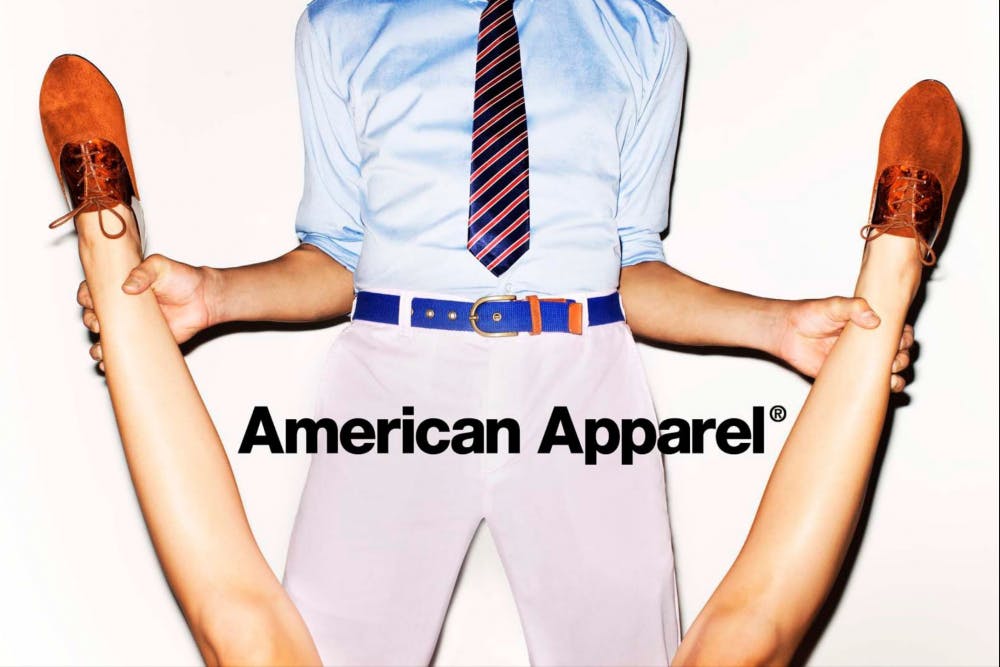Trendy, provocative, but simple—American Apparel, a once popular and thriving brand, will finally close its doors in April after years of financial turmoil. After filing for bankruptcy twice (once in 2011 and again in 2016) and ousting founder and CEO Dov Charney in 2014 because of sexual harassment lawsuits, the company was sold to Gildan Activewear. Despite recent reputation of American Apparel as a failing brand with slow sales and unchanging product lines, the company leaves a distinct cultural and economic legacy in the world of retail.
American Apparel is somewhat of a retail miracle, a store that was able to expand from a wholesale company to a trendy retailer with a global presence. It's a brand that permeates campus, from the store on 36th and Walnut to the students who rock its clothing. One policy that sets American Apparel apart from similar retailers is their “Made in LA” stance: that is, all clothing is made in the USA, with no sweatshops involved. This idea attracted many young people to its stores, and in context with its closing, will leave about 3,400 factory workers in Southern California jobless. In a time where many retailers go overseas for their production, and politicians are calling for more factory jobs in the United States, the failure of this company is more politically relevant than ever.
Although, this American–made “ethical superiority” set American Apparel apart from the rest, it was just as (in)famous for its controversial, provocative and sexualized advertising strategy. American Apparel ads, up until 2014, had a voyeuristic feel to them—featuring topless female models, camera angles often used in pornography, models in sex positions and even porn stars like Faye Reagan. In 2009, American Apparel featured award–winning porn star Sasha Grey, wearing nothing but yellow thigh-high socks in one of their campaigns. The iconic “Meet ___” format for advertisements paired with sexually provocative poses quickly became iconic and defined the company.

However, not all of its sexually charged campaigns were met with popular buzz. American Apparel came under fire for often using models that looked childlike in their campaigns, further hurting their image in relation to CEO Dov Charney’s sexual assault lawsuits. For example, the 2013 “Meet Trudy” ad was banned in the United Kingdom for featuring a vulnerable, underage looking model.
College sophomore Seb Dombrowski agrees that the retailer’s provocative ads are not well received for good reasons. "I don't really like their advertising style. I think that the voyeuristic viewpoint and sexualization of Lolita–esque models further exacerbates an issue that already plagues our society.”
The provocative marketing strategy initially worked very well, making it seem as though buying sex was as American as apple pie. Only in recent years has American Apparel changed their marketing strategy to include more inclusive and less controversial models and poses.
Though American Apparel’s advertising and workforce may be the only legacy they leave behind, Penn students are still going to miss the 80s classics, high–quality basics and well–fitting pants that American Apparel has offered for over 10 years. The brand maintained a loyal fan base for its basic staples: disco pants, colorful knee socks, ringer tees, classic jeans and lulu tops, among others.
“I always appreciated the simplistic, crisp, not–too–extra aesthetic that AA managed to cultivate," says College freshman Bernie Rogers, who's a fan of the brand. But other students, like College senior Miguel Rivera-Lanas, won’t mourn the store's closing.
“It seems like all they offered was ill–fitting tee–shirts, sweatpants and leotards," he says. "So I’m not too broken up about seeing them off.”
Regardless of how you feel about the stores products, nothing will change the legacy that this near–dead LA based retailer has left on the world. As for now, we should all take advantage of the closing sales: 40% off of everything at all stores and online, and even deeper discounts at the online factory outlet. These classics won’t be around forever.







